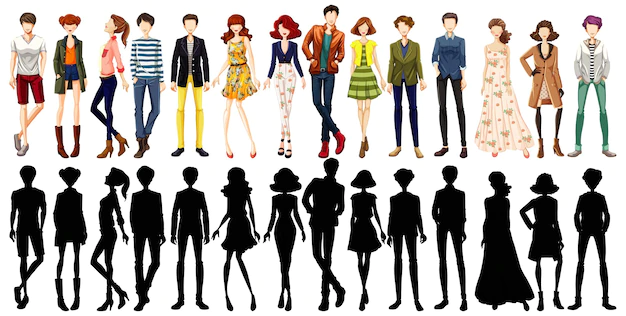Optimizing Swimsuit Selection for Enhanced Body Image and Confidence
The selection of swimwear significantly impacts an individual's comfort and self-perception, particularly during summer activities. This comprehensive guide provides a structured approach to swimsuit selection, integrating principles of body image, visual perception, and consumer behavior to empower confident swimwear choices. We will explore the interplay of body shape, color psychology, and garment fit to enhance the overall swimsuit shopping experience.
Body Shape Analysis: A Foundation for Flattering Swimwear Selection
Understanding one's body type—hourglass, pear, apple, rectangle, or inverted triangle—is paramount. This assessment, informed by somatotyping principles, allows for targeted style selection. For instance, individuals with an hourglass figure might benefit from styles emphasizing the waistline, while those with a pear shape may choose designs that balance proportions. This foundational understanding directs the subsequent selection process, guiding choices towards silhouettes that create a visually harmonious effect. This is an application of the principle of visual balance in design, leveraging clothing to create a pleasing aesthetic.
Strategic Design Elements: Enhancing Proportions and Minimizing Perceived Flaws
Once the body type is identified, attention shifts to strategic design elements. This involves applying Gestalt principles of visual perception, specifically using the concepts of figure-ground and grouping to draw attention to desirable features and minimize areas of concern. For example, strategically placed ruching or patterns can create the illusion of a more balanced silhouette. Darker colors, consistent with color psychology's influence on perceived size, can create a slimming effect, while brighter colors or patterns can accentuate specific areas. The application of these principles contributes to a tailored aesthetic, enhancing self-confidence.
Color Psychology and Pattern Selection: Mastering Visual Illusion and Personal Expression
Color psychology significantly influences perceptions of body shape and size. Darker hues such as navy or black often create a slimming effect, whereas lighter colors or bold prints can have an enlarging effect. The strategic use of vertical or horizontal stripes also manipulates visual perception: vertical stripes create a lengthening illusion, while horizontal stripes can broaden the appearance. This application of color theory and pattern design enables individuals to manipulate visual perception and create a desired aesthetic outcome. Moreover, color choices should complement skin tone and personal style, further enhancing self-expression.
Prioritizing Comfort and Support: The Importance of Fit and Functionality
Beyond aesthetics, comfort and support are crucial. For larger busts, underwire, adjustable straps, or built-in cups provide both support and comfort. The swimsuit should fit snugly but not restrict movement. Applying ergonomic principles, the swimsuit should accommodate body movements comfortably without causing pinching or discomfort. This ensures a positive sensory experience, contributing to the overall feeling of confidence and ease. Furthermore, fabric choice plays a crucial role in comfort and durability.
Exploring Swimsuit Styles: A Diverse Range of Options
Swimsuit styles offer a broad spectrum of choices. One-piece suits offer versatility, with options ranging from classic designs to those incorporating cutouts or high-cut legs to create visually lengthening effects. High-waisted bottoms offer tummy control and a retro appeal. One-shoulder designs draw attention to the neckline and shoulders. Swim dresses provide additional coverage and a more modest option. The selection should align with personal preferences and the desired level of coverage, incorporating both functional and aesthetic considerations.
Accessories such as sarongs or cover-ups enhance the overall look, providing additional coverage and stylistic options. These accessories serve both functional and aesthetic purposes, allowing for adaptability in various settings.
Mix-and-Match Approach: Tailoring to Individual Body Measurements
Purchasing separates provides the flexibility to create a custom fit that complements individual body proportions. This approach allows for a precise match between the top and bottom, ensuring both support and a flattering silhouette tailored to individual measurements. This caters to the body diversity principle, acknowledging the variation in body measurements and allowing for a personalized approach to swimsuit selection. The customizability enhances the fit and increases the wearer's satisfaction.
The Significance of In-Store Fittings: Ensuring Optimal Fit and Satisfaction
Before purchasing, in-store try-ons are essential. Sizing variations among brands necessitate physical fittings to ensure a proper fit and maximize comfort. This practical step minimizes the risk of purchasing ill-fitting swimwear, thereby enhancing satisfaction and reducing returns. This emphasizes the importance of integrating practical experience into the selection process.
Confidence: The Ultimate Flattering Accessory
Ultimately, confidence is paramount. Choosing a swimsuit that aligns with individual preferences and enhances self-perception contributes significantly to the overall positive experience. This embodies the concept of self-efficacy, where a person's belief in their ability to succeed influences their actions and outcomes. Feeling confident and comfortable in one's swimwear positively impacts self-esteem and body image.
Conclusion and Recommendations
In conclusion, selecting a flattering swimsuit involves a multifaceted approach, integrating principles of body shape analysis, color psychology, design elements, and personal preference. Prioritizing comfort and fit, along with thoughtful consideration of color and pattern, significantly impacts the overall experience. Recommendations include thorough body shape assessment, strategic use of color and pattern to enhance proportions, and careful consideration of support and comfort features. The emphasis should be on finding a swimsuit that not only looks good but also feels comfortable and enhances self-confidence. Further research could explore the psychological impact of swimsuit choice on body image and self-esteem, potentially using quantitative methods to measure the relationship between swimsuit features and self-reported confidence levels. The impact of these findings could inform future swimsuit design and marketing strategies.
Reader Pool:
What are your thoughts on the role of societal beauty standards in shaping individual preferences when choosing swimwear?
```





No comments yet. Be the first to share your thoughts!